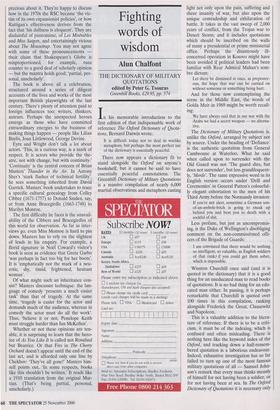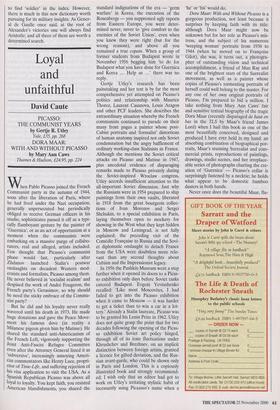Fighting words of wisdom
Al un Chalfont
THE DICTIONARY OF MILITARY QUOTATIONS edited by Peter G. Tsouras Greenhill Books, £29.95, pp. 574 In his memorable introduction to the first edition of that indispensable work of reference The Oxford Dictionary of Quota- tions, Bernard Darwin wrote: It is difficult today not to deal in warlike metaphors, but perhaps the most perfect use of the dictionary is essentially peaceful.
There now appears a dictionary fit to stand alongside the Oxford on anyone's bookshelf, but it cannot be said to have essentially peaceful connotations. The Greenhill Dictionary of Military Quotations is a massive compilation of nearly 6,000 martial observations and metaphors casting light not only upon the pain, suffering and sheer insanity of war, but also upon the unique comradeship and exhilaration of battle. It takes in the vast sweep of 2,000 years of conflict, from the Trojan war to Desert Storm; and it includes quotations which should be inscribed on the walls of many a presidential or prime ministerial office. Perhaps the disastrously ill- conceived operation in Kosovo might have been avoided if political leaders had been familiar with Rear Admiral Mahan's som- bre dictum:
Let there be dismissed at once, as preposter- ous, the hope that war can be carried on without someone or something being hurt. And for those now contemplating the scene in the Middle East, the words of Golda Meir in 1969 might be worth recall- ing: We have always said that in our war with the Arabs we had a secret weapon — no alterna- tive.
The Dictionary of Military Quotations is, unlike the Oxford, arranged by subject not by source. Under the heading of 'Defiance' is the authentic quotation from General Cambronne at Waterloo. What he said when called upon to surrender with the Old Guard was not 'The guard dies, but does not surrender', but less grandiloquent- ly, `Merde'. The same expressive word in its English version occurs under 'Drill and Ceremonies' in General Patton's colourful- ly elegant exhortation to the men of his Third Army before the Normandy invasion: If you're not alert, sometime a German son-
of-an-asshole-bitch is going to sneak up behind you and beat you to death with a sockful of shit.
Less profane, but just as uncompromis- ing, is the Duke of Wellington's disobliging comment on the non-commissioned offi- cers of the Brigade of Guards:
I am convinced that there would be nothing so intelligent, so valuable, as English soldiers of that rank; if you could get them sober, which is impossible.
Winston Churchill once said (and it is quoted in the dictionary) that it is a good thing for an uneducated man to read books of quotations. It is no bad thing for an edu- cated man either. In passing, it is perhaps remarkable that Churchill is quoted over 100 times in this compilation, ranking alongside Frederick the Great, Clausewitz and Napoleon.
This is a valuable addition to the litera- ture of reference. If there is to be a criti- cism, it must be of the indexing, which is confused and often misleading. There is nothing here like the keyword index of the Oxford, and tracking down a half-remem- bered quotation is a laborious endeavour. Indeed, exhaustive investigation has so far failed to turn up one of the most famous military quotations of all — Samuel John- son's remark that every man thinks meanly of himself for not having been a soldier, or for not having been at sea. In The Oxford Dictionary of Quotations it is necessary only to find 'soldier' in the index. However, there is much in this new dictionary worth pursuing for its military insights. As Gener- al de Gaulle once said, at the root of Alexander's victories one will always find Aristotle; and all three of them are worth a determined search.






























































































 Previous page
Previous page